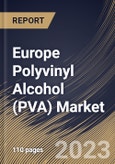Due to strict rules for its disposal and diminishing landfill availability, the sustainable packaging of the items is in high demand. Numerous variables, including the rise of the customer base, an increase in the cost per package, and sustainability, all contribute to the demand for packaging in various applications. There has been recent interest in the development of various biodegradable packaging materials. PVA-based end-use products can biodegrade more quickly if constructed of sustainable natural polymers. PVA material is a widely utilized synthetic biodegradable polymer because it degrades in various microbiological conditions. PVA is used in various industries, including ceramics, textiles, coatings, paper, and wood.
For diverse end-use industries, the varied grades are beneficial. Similar grades of the product can also be utilized for various purposes. Benefits like excellent crosslinking density and moisture resistance are expected to fuel this sector's expansion further. Due to PVA's characteristics, which include its solubility in ethanol and water and its resistance to grease and oil, there are lesser-known replacements for PVA that are readily available. However, strict regulations made it difficult for products to be used in various application areas. The National Institute for Occupational Safety and Health (NIOSH) has outlined several preventative and environmental safety measures regarding the exposure of PVA. The production of solid waste can impact people's health, particularly young children, who are more vulnerable to these dangerous contaminants.
Europe is home to several major agricultural nations, each with its unique contributions to the continent's agricultural landscape. France, often called the "breadbasket of Europe," stands as a leading producer of wheat and boasts a thriving dairy industry, renowned for its cheese. Spain is celebrated for its vast olive groves and vineyards, making it a primary source of olive oil and wine. Meanwhile, Italy is famous for its wines, pasta, fruits, and vegetables, with olive oil and cheese production being notable strengths.
Additionally, PVA is used in the production of contact lenses, including innovative types such as extended-wear lenses and those designed for specific eye conditions. The European sector for contact lenses continues to evolve with new materials and designs. PVA is used as a support material in 3D printing due to its water-solubility. In Europe, this technology is being applied to various industries, including healthcare, automotive, and aerospace, for creating complex and intricate structures. As a result, the demand for polyvinyl alcohol in Europe will increase in the coming years.
The Germany market dominated the Europe Polyvinyl Alcohol (PVA) Market, By Country in 2022, and would continue to be a dominant market till 2030; thereby, achieving a market value of $61.4 million by 2030. The UK market is exhibiting a CAGR of 5.5% during (2023 - 2030). Additionally, The France market would experience a CAGR of 7.2% during (2023 - 2030).
Based on End-use, the market is segmented into Food Packaging, Paper, Construction, Electronics, and Others. Based on countries, the market is segmented into Germany, UK, France, Russia, Spain, Italy, and Rest of Europe.
The market research report covers the analysis of key stake holders of the market. Key companies profiled in the report include DuPont de Nemours, Inc., Mitsubishi Chemical Holdings Corporation, Eastman Chemical Company, Sekisui Chemical Co. Ltd., Kuraray Co. Ltd., Denka Company Limited, Anhui Wanwei Group Co., Ltd., Celanese Corporation, Merck KGaA, AND Wacker Chemie AG.
Scope of the Study
Market Segments Covered in the Report:
By End-use (Volume, Metric Ton, USD Million, 2019-2030)- Food Packaging
- Paper
- Construction
- Electronics
- Others
- Germany
- UK
- France
- Russia
- Spain
- Italy
- Rest of Europe
Key Market Players
List of Companies Profiled in the Report:
- DuPont de Nemours, Inc.
- Mitsubishi Chemical Holdings Corporation
- Eastman Chemical Company
- Sekisui Chemical Co. Ltd.
- Kuraray Co. Ltd.
- Denka Company Limited
- Anhui Wanwei Group Co., Ltd.
- Celanese Corporation
- Merck KGaA
- Wacker Chemie AG
Unique Offerings
- Exhaustive coverage
- The highest number of Market tables and figures
- Subscription-based model available
- Guaranteed best price
- Assured post sales research support with 10% customization free
Table of Contents
Companies Mentioned
- DuPont de Nemours, Inc.
- Mitsubishi Chemical Holdings Corporation
- Eastman Chemical Company
- Sekisui Chemical Co. Ltd.
- Kuraray Co. Ltd.
- Denka Company Limited
- Anhui Wanwei Group Co., Ltd.
- Celanese Corporation
- Merck KGaA
- Wacker Chemie AG








